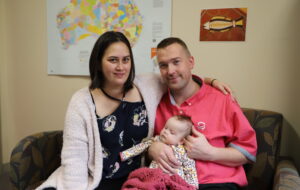Suffering from an irritable uterus, Williams Landing mother of three Gelisa Duffin became a frequent flyer to a CBD Emergency Department when she was just 14 weeks pregnant with her fourth baby.
“I was there three times a week, every time it felt like I was going into labour,” Gelisa recalls.
Tiny baby Ava eventually arrived in a flurry on 11 February, at just 32 weeks and six days. She spent a week in her birth hospital before she was transferred to
the Werribee Mercy Hospital Special Care Nursery, around the corner from home.
There, Gelisa met Aboriginal Women’s and Children’s Liaison Samantha Bennett and Aboriginal Hospital Liaison Officer Jessica Gavin, who leaned in to support her and her husband Jason while
baby Ava was in hospital.

Gelisa and Jason Duffin with baby Ava at Werribee Mercy Hospital
“We haven’t had a lot of family support, so it has been really good to have Sam and Jess there to support us,” Gelisa says.
“They advocate for you, stand up for you, they’re a voice for you. Sometimes, they are just someone to talk to.”
Jason says all of the Mercy Health staff were “incredibly supportive” and it was a relief to know that Sam and Jess were looking out for them.
“We had never been separated from our kids before,” Jason reflects. “We had to wait weeks and weeks before Ava could come home.”

Gelisa, Jason and Ava with the Aboriginal hospital liaison team Samantha Bennett (left) and Jessica Gavin (right)
Since joining Werribee Mercy Hospital in late 2021, Jessica and Samantha have been busy increasing representation around the hospital so that staff know to call them when an Aboriginal or Torres Strait Islander patient asks for support.
“Aboriginal patients often arrive with a lot of distrust, they just want us to sit with them so they know they are safe,” Jessica says.
“The more we do that, the more we see people coming in when they are unwell instead of prolonging it — some literally at death’s door before they come in.
“It has made a big difference, especially with people who are in hospital every few weeks. Slowly, slowly, we are seeing change.”
Jessica says the most important thing staff can do is to ‘ask the question’: Are you of Aboriginal or Torres Strait Islander origin? “Don’t assume,” Jessica says. “And if they say yes, offer to give us a call.”



